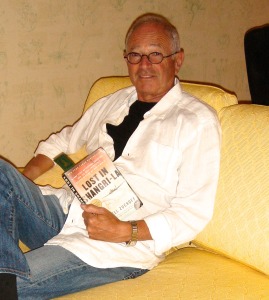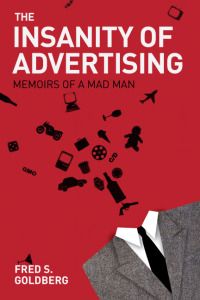Have you ever wondered what it was like in the crazy days of advertising during the greatest boom of our time?
I mean what it was really like? If you want to get a real insider view of the marketing world pick up Fred Goldberg’s new book The Insanity of Advertising (Memoirs of a Mad Man). In Fred’s words, this is a collection of stories gleaned from 30 cartons of materials, over a 35-year period, based on “real, absolutely truthful, on the ground intel from someone who saw it happening right before his eyes.”
Fred entered advertising in 1967, and has led some of the greatest agencies in history: Young & Rubicam, Chiat/Day and Goldberg Moser O’Neill. His experience reads like a who’s who of great advertising visionaries, and his work included the most iconic ad of all history—the Apple 1984 Super Bowl commercial.
If you don’t know Fred’s name, and you’re in advertising, shame on you. Now go buy the damn book and learn something about our crazy, insane, wonderful, funny, world of advertising. After all, Fred said: “I was a Mad Man having started my advertising career in the 60s on Madison Avenue. And some might argue that ‘Madison Avenue’ is a state of mind, but back then the preponderance of agencies located on and around Madison Avenue and the way they did business was pervasive. You could also conclude that many people who worked in the ad business were either angry, crazy or totally ego driven. All of which is reflected in the Mad Man moniker.”
NewBusinessHawk 10 Questions on the Ad Business:
1. How did you get into advertising?
I went away to college to become a brain surgeon and didn’t get through organic chemistry and zoology. Went to grad school and was accepted into the doctoral program which I didn’t complete. Was asked to join Young & Rubicam which was one of the ad agencies servicing my first employer. Didn’t know what I was getting into but it sounded like fun.
2. First job in the business?
Market Research Analyst at a Beer Company. P. Ballantine & Sons in Newark, NJ.
3. New business is really the art of ____________?
PERSISTENCE.
Care to explain?
There is a lot that goes into new business: hard work, creative canvassing, repetition, clever positioning, selling on many levels, credibility and trust and luck and timing. But being determined and keeping at whatever it is…a specific target client, a certain industry, etc. it requires, in my mind, keeping the flow and connection with relevant communication.
4. A pitch is really all about _____________?
CHEMISTRY
And why?
From the client perspective I think it’s about reviewing the process, the people and the work from an agency. From the agency it should be about whether this client is a good fit and really wants to do intrusive and meaningful communications. Will they accept new ideas? Too often I think clients want to be associated with the creative agencies, but when it comes time to promote their product it becomes different from all the ones you showed on your reel and print book.
5. What was your worst new business experience? Lessons learned?
I have had many. Don’t know how to identify the ‘worst’ one. On the one hand, arriving at the Nintendo prospects offices in Seattle and our bags/materials went to Vancouver. We presented off of back up 8×10 decks and had no work to show. We were the only one of the five agencies that didn’t present speculative work and not because the bags got lost. We lost the business because I got in an argument with the CEO over this issue.
Maybe not the ‘worst’ but the hardest was pitching Sony Playstation. We got down to the finals against Chiat/Day, which was the agency I had purchased Goldberg Moser O’Neill from. Obviously, I wanted to win this one for more reasons than I can put down here. We spent an enormous amount of time, money and emotion, only to lose out in the end.
6. What do you consider to be your most satisfying new business pitch?
By far the most satisfying was winning the KIA Motors business when they were first introducing to America. We had some minor opportunities in pitching a car account before that, but this turned out to be the real deal. It was a challenge, and they had a small but significant budget. Most of all they seemed to desire the kind of work we did. We had a brilliant strategy. And unlike the other agencies in this review, we did not present speculative work although we did put together a truly great 15-minute strategic positioning piece, which I am certain played importantly in our winning the business. Oh and when we showed it, I had Korean sub-titles in place so not to leave the translation to the American executives. There is a chapter on this in my book.
But frankly to answer this question I could have put down a dozen more that made me very satisfied. In fact, whenever I won a piece of business, large or small, I was very happy.
7. If you could change one thing in this business it would be?
Shoot all the articulate incompetents. And then shoot all the bullshitters.
8. What do you think marketing will be like in 10 years?
Different. Very different.
9. Advice you would give the 25-year old you?
Read the Insanity of Advertising before deciding on advertising as a career.
10. If you had to start an agency today it would be focused on? And why?
I wouldn’t. I think the business has changed so significantly that I wouldn’t know where to start. I think someone needs to figure out how to create and implement new ideas of communication in this new world. They haven’t really as yet. When they do, being the most clever and creative company delivering fresh and unique and persuasive communications would remain my focus if I had to start an agency.
Any final thoughts?
ADVERTISING SUCKS! GOOD ADVERTISING SUCKS BETTER!
You can read more about the book, the ads, and the man here: http://theinsanityofadvertising.com/



